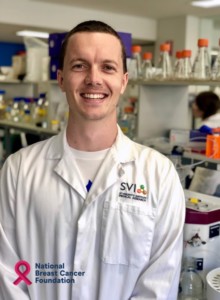
Dr Rohan Bythell-Douglas is just one of the researchers who has been funded through NBCF’s research grants this year, leading a project to bring a breakthrough imaging technique to Australia for the first time to learn more about the FANCM gene.
This technique, called cryo-electron microscopy, will provide very detailed molecular information on the variants of the FANCM gene.
Dr Bythell-Douglas will use this information to investigate why the FANCM gene mutations predispose women to breast cancer.
The findings will improve upon current information for women interested in their genetic risk while also helping those with a predisposition to breast cancer seek appropriate ways to manage their risk.
Our research aims to understand the fine molecular details of how a DNA damage repair protein functions. This information will help us predict whether specific patient mutations in this protein are likely to lead to cancer.
“Our research aims to understand the fine molecular details of how a DNA damage repair protein functions. This information will help us predict whether specific patient mutations in this protein are likely to lead to cancer.” Dr Rohan Bythall-Douglas, NBCF-funded researcher
Read more about Dr Rohan Bythell-Douglas’s project here.
Why research into familial breast cancer is so important
Breast cancer is a disease that Marie and her family have experienced first-hand across generations. Marie was diagnosed with the disease twice – first in 2000 at the age of 41, and again, two years later when she was re-diagnosed.
After surgery and radiation treatment, Marie overcame breast cancer and eventually went back to work as a nurse. But her story doesn’t end there. Marie also had to witness her mum go through breast cancer, who passed away five years after her diagnosis. In addition to this, her sister experienced the cruel disease.
Marie remains passionate about highlighting the importance of knowing your breast cancer risk.
“Research into familial breast cancer is extremely important to me as my sisters have sons and daughters who have perhaps inherited this gene,” says Marie.
“Research is imperative in identifying genetic predisposition for those family members in the future. There is hope that with an early diagnosis there may more done in preventing and managing the disease.”
More News Articles
View all News




